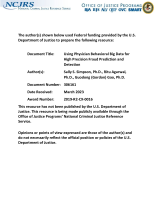Fraud
Drivers of Criminal Legal System Processes for Physician Fraudsters in Federal Court
The Effects of Risky Behaviors and Social Factors on the Frequency of Fraud Victimization Among Known Victims
Property Crime Victimization and Crime Prevention - A Study Among Farm Operators - Executive Summary
Responses to Fraud and Abuse in AFDC (Aid to Families With Dependent Children) and Medicaid Programs
Responses to Fraud and Abuse in AFDC (Aid to Families With Dependent Children) and Medicaid Programs - Executive Summary
Practitioner Fraud and Abuse in Government Medical Benefit Programs
White Collar Crime and Criminal Careers
Detection and Prevention of Fraud and Abuse in Human Services Programs Contracted For by Government Agencies: Executive Summary
Insights Into Mail Fraud Come From Scammers’ Own Records
Fraud Narratives: The ecology of skepticism towards Latino immigrants
Using Scammers’ Data to Estimate the Impact and Importance of Preventing Repeat Mail Fraud Victimization
Fraud Victimization Across the Lifespan: Evidence on Repeat Victimization Using Perpetrator Data
Examining Financial Fraud Against Older Adults
Victim Compensation Policy and White-Collar Crime Public Preferences in a National Willingness-to-Pay Survey
Using Physician Behavioral Big Data for High Precision Fraud Prediction and Detection
Enabling the Enablers: An Identity Fraud Solution for Law Enforcement
Arrogant Chameleons: Exposing Fraud-Detection Homicides
Supplemental Fraud Survey (Bureau of Justice Statistics)
The National Crime Victimization Survey’s (NCVS) Supplemental Fraud Survey (SFS) collects data on the experiences of adults across seven types of personal financial fraud during the preceding 12 months. It also collects information on victim characteristics, and whether the incident was reported to police or others.



